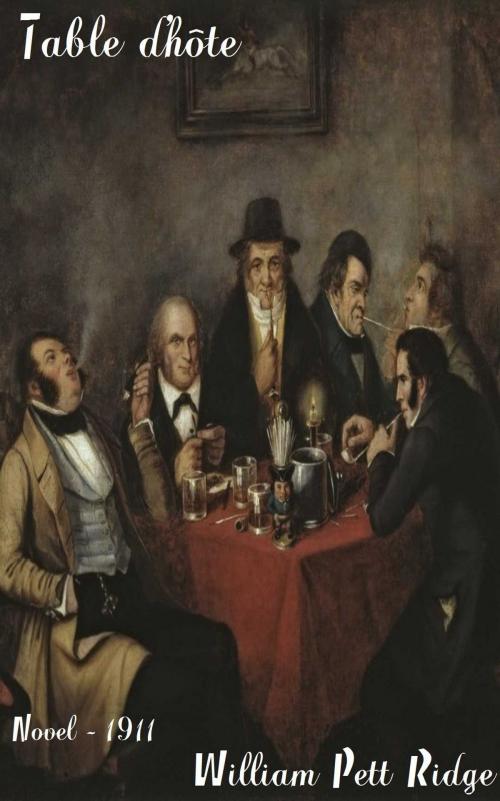| Author: | William Pett Ridge | ISBN: | 1230002918068 |
| Publisher: | London ; New York : Hodder and Stoughton, 1911 | Publication: | November 24, 2018 |
| Imprint: | Language: | English |
| Author: | William Pett Ridge |
| ISBN: | 1230002918068 |
| Publisher: | London ; New York : Hodder and Stoughton, 1911 |
| Publication: | November 24, 2018 |
| Imprint: | |
| Language: | English |
CHANGE OF GOVERNMENT....
“Boots!” he roared, for the second time. His wife, opening the kitchen door, looked in, and surveyed him.
“If I have to order you,” said Mr. Baynes, speaking with great distinctness, “to come and take off my boots again, I shall dock half a crown off your weekly allowance to-morrow.”...
She did not answer....
“My best plan,” he went on, “will be to draw it all up in black and white, so that we can have a clear and proper understandin’ one with the other. We must have a proper system of fines, same as they do in every well-regulated business. Fetch the pen and ink and paper.”...
“How would it be to fetch it for yourself?”...
He stared at her amazedly. Searching his pockets, he found there a small memorandum-book and a short piece of pencil.
“I’m going to keep calm with you,” he said deliberately, “because, so far as I can see, you’ve taken leave, for the present, of your senses. You’ll be sorry for it when you come back to ’em. Now then, let’s make out a list. ‘For not answering when called, one shilling.’”
He wrote this carefully on a page, regarding it with satisfaction at the finish. “See what that means? That means, for every time you pretend to be deaf when I shout at you, you’ll be docked a bob at the end of the week.”
“I see.”
“Just as well you do,” remarked Baynes threateningly. “We will now proceed to the next item: ‘Food not cooked to W. B.’s satisfaction, one-and-six.’ How many t’s in ‘satisfaction’?”
“Many as you like.”
“Impudence,” he continued, writing as he spoke, “one-and-three. Wait a bit; I haven’t finished yet. ‘Clean collar not ready when required, sixpence.’”
“There won’t be anything left,” mentioned his wife, “if you put many more down.”
“Rests with you,” giving a careless gesture. “All you’ve got to do is to see that none of these rules are broken. I shall take the trouble presently of copying out the list, and you’ll do well to stick it up on the wall in some prominent position, so that you can be reminded of it several times in the course of the day.”
“And when any of my relatives look in they can see it too?”
“Reminds me,” he said, taking his pencil again. “‘Relations, two a month. All in excess of this number, fourpence per relation.’ Take the list and read it out to me, and then kneel down and take off my boots as I ordered you to do some considerable time ago.”
Mrs. Baynes accepted the list, inspected it; then tore the page into several pieces and threw these into the fireplace. In the pocket of an underskirt she found a purse, and from this brought four new banknotes.
“Have a good look at them, William,” she said. “You won’t get a chance of seeing them again. I’m just going along to the Post Office to put them away before it closes.”
“How—how did you come by them?”
“I’m not bound to answer you,” remarked Mrs. Baynes, “but perhaps I may as well. The money has come to me from poor Uncle Ernest, who popped off last month. He’s left a sim’lar amount to my two sisters.”
“You was his favourite,” said Baynes, “and if he’d got money to leave—and this is the first I’ve heard of it—he ought to have left it all to you. I must have a glance at his will and see whether we can’t dispute it.”
“You’ll do nothing of the kind.”
CHANGE OF GOVERNMENT....
“Boots!” he roared, for the second time. His wife, opening the kitchen door, looked in, and surveyed him.
“If I have to order you,” said Mr. Baynes, speaking with great distinctness, “to come and take off my boots again, I shall dock half a crown off your weekly allowance to-morrow.”...
She did not answer....
“My best plan,” he went on, “will be to draw it all up in black and white, so that we can have a clear and proper understandin’ one with the other. We must have a proper system of fines, same as they do in every well-regulated business. Fetch the pen and ink and paper.”...
“How would it be to fetch it for yourself?”...
He stared at her amazedly. Searching his pockets, he found there a small memorandum-book and a short piece of pencil.
“I’m going to keep calm with you,” he said deliberately, “because, so far as I can see, you’ve taken leave, for the present, of your senses. You’ll be sorry for it when you come back to ’em. Now then, let’s make out a list. ‘For not answering when called, one shilling.’”
He wrote this carefully on a page, regarding it with satisfaction at the finish. “See what that means? That means, for every time you pretend to be deaf when I shout at you, you’ll be docked a bob at the end of the week.”
“I see.”
“Just as well you do,” remarked Baynes threateningly. “We will now proceed to the next item: ‘Food not cooked to W. B.’s satisfaction, one-and-six.’ How many t’s in ‘satisfaction’?”
“Many as you like.”
“Impudence,” he continued, writing as he spoke, “one-and-three. Wait a bit; I haven’t finished yet. ‘Clean collar not ready when required, sixpence.’”
“There won’t be anything left,” mentioned his wife, “if you put many more down.”
“Rests with you,” giving a careless gesture. “All you’ve got to do is to see that none of these rules are broken. I shall take the trouble presently of copying out the list, and you’ll do well to stick it up on the wall in some prominent position, so that you can be reminded of it several times in the course of the day.”
“And when any of my relatives look in they can see it too?”
“Reminds me,” he said, taking his pencil again. “‘Relations, two a month. All in excess of this number, fourpence per relation.’ Take the list and read it out to me, and then kneel down and take off my boots as I ordered you to do some considerable time ago.”
Mrs. Baynes accepted the list, inspected it; then tore the page into several pieces and threw these into the fireplace. In the pocket of an underskirt she found a purse, and from this brought four new banknotes.
“Have a good look at them, William,” she said. “You won’t get a chance of seeing them again. I’m just going along to the Post Office to put them away before it closes.”
“How—how did you come by them?”
“I’m not bound to answer you,” remarked Mrs. Baynes, “but perhaps I may as well. The money has come to me from poor Uncle Ernest, who popped off last month. He’s left a sim’lar amount to my two sisters.”
“You was his favourite,” said Baynes, “and if he’d got money to leave—and this is the first I’ve heard of it—he ought to have left it all to you. I must have a glance at his will and see whether we can’t dispute it.”
“You’ll do nothing of the kind.”















